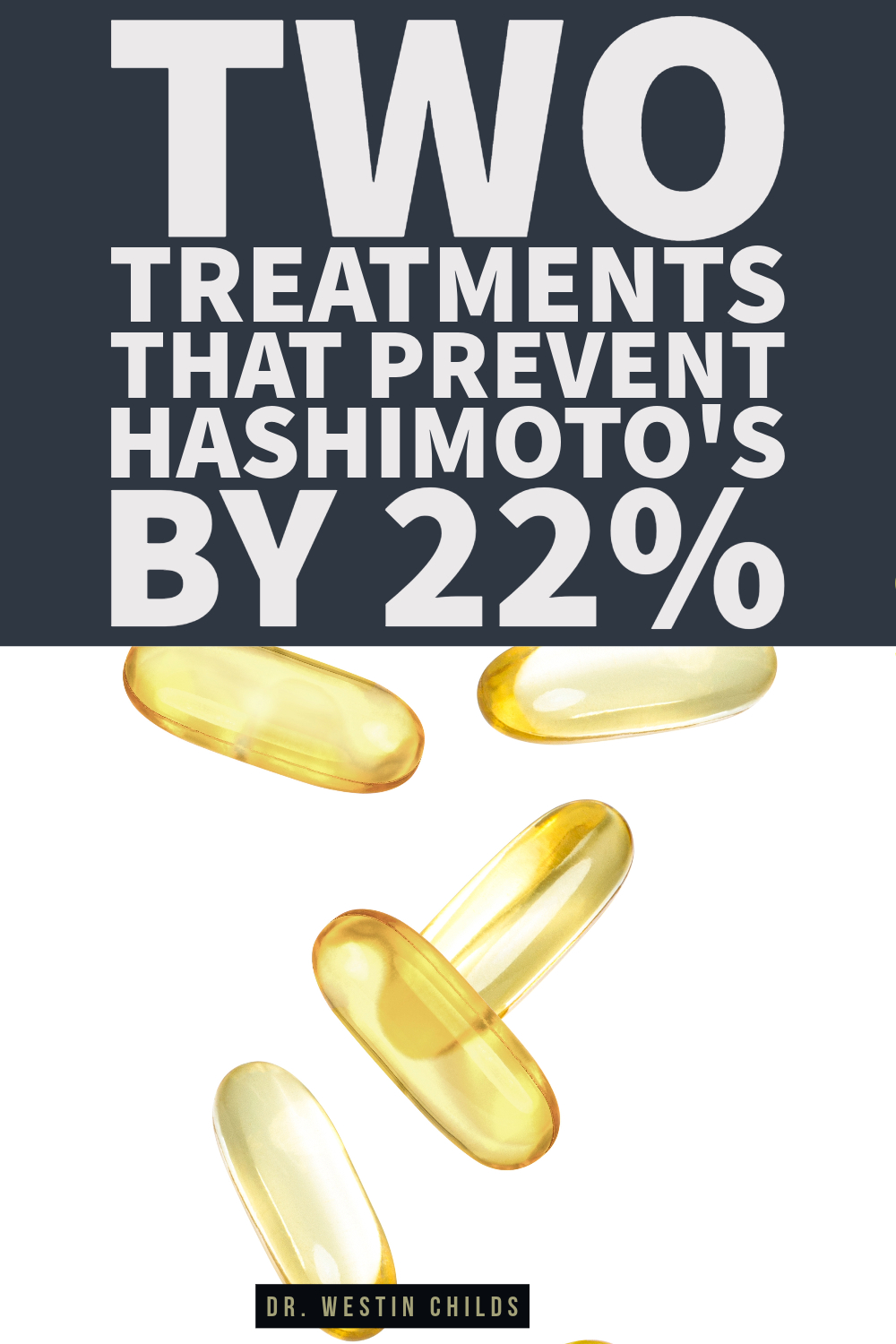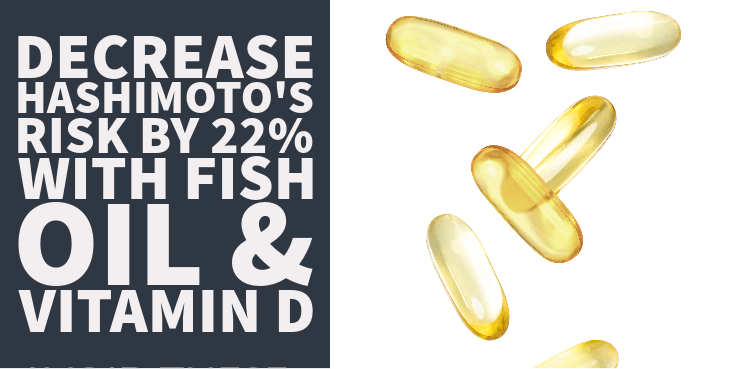Do you want a simple way to decrease your risk of Hashimoto’s by 22% just by using 2 supplements?
Out of all autoimmune diseases out there, Hashimoto’s still remains one of the most difficult to treat and difficult to diagnose.
A big part of the reason for this is that doctors aren’t too worried about the destruction of the thyroid gland because, they believe, the problem can easily be fixed with a little bit of thyroid medication.
If this doesn’t sit well with you, you aren’t alone.
Most patients with Hashimoto’s don’t like the idea of their body destroying their thyroid gland and becoming reliant on thyroid medication for life.
Which is why this study is very interesting:
This placebo-controlled study followed 25,000 people for 5 years (1) and found something very interesting:
People who took a combination of fish oil and vitamin D supplements saw a decrease in their risk of all autoimmune diseases by 22%.
The results of this study can’t be understated.
In a world where very few treatments are available to patients who have autoimmune diseases, here we have a study showing that you can actually mitigate your risk by a significant amount with some simple relatively inexpensive, over-the-counter supplements.
This is huge both for patients with existing thyroid disease (which is many of you watching right now) and also for those who are just trying to stay healthy and prevent thyroid disease or autoimmune disease.
So if you have a strong family history of thyroid problems, this is exactly the type of thing that you’d want to look into because it means you may prevent your future thyroid problem from ever surfacing.
And, don’t worry, there’s also some beneficial information in here for those who already have thyroid disease because these treatments can still be helpful even in that situation as well.
With this in mind, let’s talk about some of the main takeaways from this study so that you can learn from it and, hopefully, apply the information starting right away.
DOWNLOAD FREE RESOURCES
Foods to Avoid if you Have Thyroid Problems:
I’ve found that these 10 foods cause the most problems for thyroid patients. Learn which foods you should avoid if you have thyroid disease of any type.
The Complete List of Thyroid Lab tests:
The list includes optimal ranges, normal ranges, and the complete list of tests you need to diagnose and manage thyroid disease correctly!
Takeaways From The Study
If you just want the meat and you aren’t interested in my comments (I’m hurt but I understand), here are the doses that were used in this study:
- 2,000 IU of vitamin D3 as cholecalciferol taken daily
- And 1 gram of fish oil that contained 460mg of EPA and 380mg of docosahexaenoic acid (EPA and DHA)
These two supplements were enough to provide that 22% reduction in autoimmune disease that I mentioned.
Having said this, I would still recommend sticking around till the end because I think there are some tweaks that you can make to this regimen to make it even more effective.
Okay, with that out of the way, let’s talk about some takeaways:
#1. The reduction in autoimmune disease is probably higher than 22%.
The official stated benefit is a 22% reduction in autoimmune disease when using fish oil and vitamin D, but the actual number is probably much higher than that, somewhere around 30% to 40%.
The reason for this is that the researchers who conducted the study could only include people with verifiable autoimmune diseases when calculating the benefit of these two supplements.
They were not able to include people who had what we call probable autoimmune disease.
And those with probable autoimmune disease make up a huge portion of people who suffer from the effects of autoimmune disease including thyroid disease.
There are plenty of people out there, perhaps even you, who suffer from many of the symptoms of autoimmune disease but don’t have the markers in their blood to confirm it.
These people are either really early on in their disease progression, which means the markers will show up in the future, or, they have an atypical type of autoimmune disease that gets missed by standard lab tests.
A perfect example of this would be seronegative Hashimoto’s which is the presence of autoimmune thyroid disease with negative thyroid antibodies (2).
So if you are thinking about using these treatments realize that their benefit is probably much greater than what is stated in this study.
#2. The benefit from these treatments applies to ALL autoimmune diseases, not just thyroid autoimmune diseases.
Even though there are a huge number of autoimmune diseases out there, they all have one thing in common:
They cause disruption in the immune system which results in damage to the body.
The location of the autoimmune disease and the damage it causes may be different from disease to disease, but the underlying cause is always the same:
Immune dysregulation.
This is important because if you already have autoimmune thyroid disease, you are much more likely to get another.
Autoimmune diseases like vitiligo and celiac disease often go hand-in-hand with Hashimoto’s (3).
And if you can do something to prevent the onset of these new autoimmune diseases, you will definitely want to take it.
#3. The longer you take these supplements, the bigger the benefit.
When looking at the results, the researchers found that if they only looked at the last 3 of the 5 years, the benefit of taking vitamin D alone jumped all the way up to 39% from 22%.
In other words, there was a decrease in autoimmune disease in people who had been taking vitamin D daily consistently for 2 years which was almost twice that of the entire study.
What gives?
Well, one conclusion we could draw here is that vitamin D needs to build up in the system over time to provide the majority of its benefits.
This is super important to understand if you are someone taking vitamin D because it’s typically not a supplement that provides a noticeable effect when you take it.
Most people just take vitamin D because they were told they were low or deficient.

But even when they take it, it’s not like they notice some huge difference in their health.
But here I’m saying that even though you may not feel that difference, it’s definitely working in your body.
And this benefit needs time to build up.
So if you have been taking vitamin D and haven’t really noticed much of a difference in how you feel, that’s okay!
It’s still doing its job behind the scenes so stay the course.
We can probably also say that vitamin D is best used as a preventative treatment as opposed to a therapeutic agent.
What this means is that it’s far better to keep your vitamin D at a healthy level to PREVENT disease than it is to increase your vitamin D once you already have a disease.
#4. Even if you already have an autoimmune disease, there’s still good reason to take vitamin D and fish oil.
The study I’ve been discussing focused on the benefit that fish oil and vitamin D have for the prevention of autoimmune disease, not necessarily for the efficacy of these treatments if you already have an existing disease.
But I’m here to tell you that even if you are someone who already has autoimmune thyroid disease like Hashimoto’s, it’s still a very good idea to consider taking both of these treatments.
Here’s why:
Not only do we have research to suggest that fish oil and vitamin D provide benefits to people who already have Hashimoto’s, but we also have a lot of anecdotal evidence to suggest they are effective as well.
From a research and physiologic standpoint, here’s what we know:
Both fish oil and vitamin D play an important role in regulating inflammation and the immune system.
This means they are obviously good for preventing autoimmune disease, but they also play a role in treating it when it already exists.
Vitamin D, for instance, regulates genes involved in inflammation and in the acquired and innate immune system (4).
We see vitamin D receptors on immune cells like monocytes and activated t cells and we’ve seen studies showing that vitamin D supplementation can balance the TH1:TH2 ratio.
Likewise, several studies have shown that fish oil supplementation has a beneficial effect on several autoimmune diseases (5).
This is most likely because it provides a balance to excess arachidonic acid which is known to be immuno-stimulatory.
On top of this, I’ve also personally seen many patients with Hashimoto’s use these treatments and see significant improvement in their symptoms when doing so.
Both of these treatments are probably best when used preventatively, but they are still beneficial even if you already have Hashimoto’s or another autoimmune disease.
#5. You can probably get even better results by taking more vitamin D and a higher fish oil dose.
While I think the researchers here did a good job, it’s evident that they were trying to apply broad recommendations to a huge group of people.
One way this backfired was in patients who were obese.
They noticed that patients who were overweight saw less benefit from vitamin D compared to those who were less overweight.
You might conclude from this that people who are overweight just don’t benefit as much from vitamin D supplementation compared to people who are leaner.
But I don’t think that’s what’s actually happening here.
We know that the patients in this study were only given 2,000 IUs of vitamin D3.
But we also know from other studies that because vitamin D is a fat-soluble vitamin, people with extra fat on their bodies need more vitamin D to saturate their tissues compared to those at a normal body weight.
Had obesity been accounted for when determining vitamin D dose, it’s very likely that overweight patients would have seen a similar response to vitamin D supplementation.
The same sort of thing probably applies to the fish oil dose as well.
Participants in this study were given 1 gram of fish oil each day, but there’s likely even more benefit at higher doses of fish oil.
Do Higher Doeses Work Even Better?
I would consider the doses given in this study to be the bare minimum if you are considering using them.
I can’t tell you exactly how much you should take but I can give you some averages based on my own experience:
If you have Hashimoto’s and you’re looking to supplement with vitamins then a good range is somewhere between 2,000 and 5,000 IUs each day but doses can go as high as 10,000 IU per day and, rarely, some people take doses as high as 50,000 IU per day which is so-called mega dosing.
This is anywhere from 2 to 5x the amount used in this study for vitamin D.
For fish oil, most people find benefits around 2-3 grams per day which is roughly 2-3x the dose used in this study.
But I’ve also seen studies of doses as high as 5 grams per day as well for other autoimmune diseases like rheumatoid arthritis (6).
In a perfect world, you should try to get as much vitamin D3, EPA, and DHA as you can from food sources.
That means at least 2-3 servings of low mercury fish each week as these are the best sources of both.
If you don’t like fish, or you can’t get it for whatever reason, then make up the difference with supplements.
While vitamin D and fish oil are great for treating Hashimoto’s, did you know there are also other supplements that can help as well?
If you want to learn about additional supplements that can help you manage your thyroid and immune system then check out this article next.
Recap
- The use of fish oil and vitamin D3, when taken in combination, may be able to mitigate your risk of developing Hashimoto’s by up to 22%.
- The benefit of these two supplements increases over time, so if you plan to take them, plan to take them long-term.
- Ideally, try to get fish oil from food and your vitamin D from a combination of sunlight and vitamin D-rich foods.
- If you need to supplement then using doses higher than the 2,000 IU of vitamin D3 and 1 gram of fish oil will probably provide additional benefits.
- Even if you already have Hashimoto’s thyroiditis, you can still benefit from using these supplements.
Now I want to hear from you:
Are you currently taking fish oil or vitamin D3?
Have you noticed any benefits since taking them? How long have you been on them?
If not, are you planning on adding these to your treatment regimen?
Or are you planning on getting more of these compounds through your diet?
Leave your questions or comments below!
Scientific References
#1. ncbi.nlm.nih.gov/pmc/articles/PMC8791065/
#2. pubmed.ncbi.nlm.nih.gov/24743395/
#3. ncbi.nlm.nih.gov/pmc/articles/PMC9865436/
#4. ncbi.nlm.nih.gov/pmc/articles/PMC6047889/
#5. ncbi.nlm.nih.gov/pmc/articles/PMC9831136/
#6. onlinelibrary.wiley.com/doi/abs/10.1002/art.1780380813?sid=nlm%3Apubmed










Do any of your supplements include fish oil and vitamin D in the correct amounts or should we plan on adding them to our regime? Thank you.
Hi Carol,
I do not have a fish oil supplement at this time.
Fish oil supplements give me extreme indigestional pain, and I can’t take them. One of my main problems is inflammation in the chest, where gas does not travel up or down, but stays stuck and it is extremely painful. I’ve cut out Gluten which helps, recently diagnosed with Hashimotos and recently had my Thyroid removed. I know fish oils would be very beneficial, and I’m not sure I can consistently add natural food sources to my diet consistly. Do you have any recommendations?
Hi Kris,
You can try black seed oil in its place: https://www.restartmed.com/black-seed-oil-hashimotos/
What brand of fish oil do you recommend?
Hi Felicea,
I don’t have a recommended brand right now to recommend but if that changes, I will update this article.